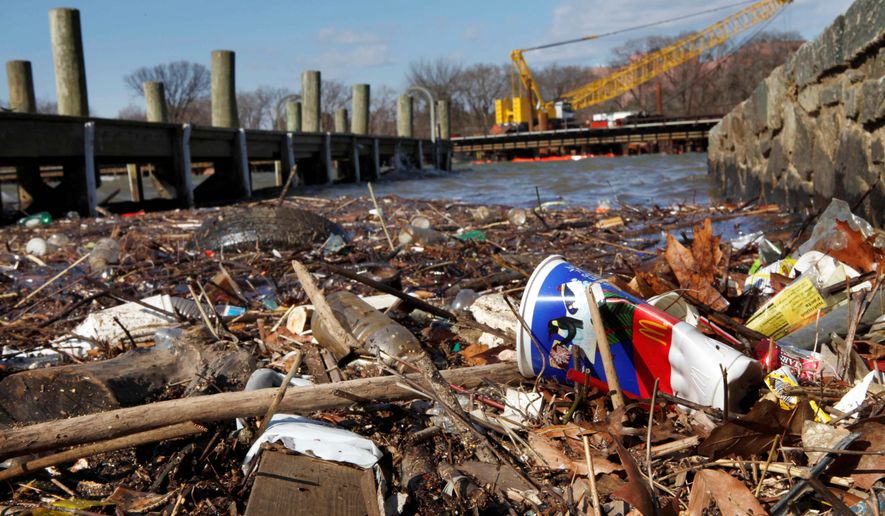OPINION:
Here in the nation’s capital, we have the opportunity to set an example for the rest of the country about responsibly reducing the use of plastics and litter. On Nov. 15, America Recycles Day, we should take a moment to reflect on how we can all do more to protect critical waterways in D.C. — like the Anacostia River — and the surrounding watershed area.
As executive vice president of the Maryland/Delaware/District of Columbia Beverage Association, I understand the need for thoughtful solutions to address the issue of waste and litter in our waterways.
That’s why I’m proud of the work America’s leading beverage companies have undertaken to increase recycling and reduce waste in our communities. We ensure our products can be easily recyclable by producing 100 percent recyclable aluminum, glass and plastic containers, making them among the most recycled consumer products in the world.
We are supporting programs that have been shown to increase recycling and keep reusable materials from ending up in landfills or thrown on the ground as litter.
For example, D.C.’s beverage industry, which includes competitors Coca-Cola, Pepsi, Dr Pepper, Canada Dry and others, funded public space recycling bins, refurbished playgrounds, partnered with local neighborhoods and business improvement districts on beautification projects, provided grants for the direct benefit of the Anacostia Watershed, and assisted with funding for a summer youth camp that is improving the health of the Anacostia Watershed.
Nationally, beverage companies provide significant funding for comprehensive recycling systems in communities across the country to minimize waste and increase efficient reuse of our packaging. Our industry lends its expertise to cities and towns trying to improve their recycling programs and has provided local grants to communities, enabling them to clean up public spaces and collect more recyclables.
We also know that the right approach starts with smarter use and disposal of manufacturing and production materials. America’s leading beverage companies are working to eliminate landfill-bound waste. They have committed to divert from landfills 100 percent of the waste generated at their U.S. manufacturing and production facilities, reaching 93 percent in 2018. Several beverage facilities have achieved zero waste, and several more are diverting 99.5 percent of their waste from landfills.
There is absolutely no reason for waste to end up as litter, particularly beverage containers, given their value as recyclables. This is especially important in areas near our rivers, where waste can be so damaging to the ecosystem. That’s why beverage companies focus attention on making recycling available in proximity to waterways, supporting efforts to help municipalities get the resources to collect and recycle at public spaces like parks and shorelines. Every one of our containers can be recycled and repurposed if they are placed in a recycling bin. Even the caps are recyclable.
Beverage companies are also reducing the plastic we use. We have saved hundreds of millions of pounds of raw materials by lightweighting containers, removing millions of pounds of packaging materials from the market in recent years. With less plastic in circulation, there is less waste that can end up in the Potomac or Anacostia Rivers.
We’re taking on other efforts to address the health of waterways and watersheds in our towns and cities, including reducing water usage. In the last five years, we reduced water usage by 4.4 percent per unit industry-wide, but we’re not stopping there. The industry has set a goal to continue to decrease water use per unit of product and will increase water conservation by double-digit percentages over the next decade.
Our industry has teamed up with groups such as the Nature Conservancy, the U.S. Forest Service and local water districts to restore and protect key watersheds across the country, understanding that when we come together, we can go further.
We’re also going further to reduce our carbon footprint with fleet efficiency. Our fleets contain the largest number of heavy-duty hybrid electric commercial trucks of any industry in North America. These trucks reduce emissions by up to 30 percent per vehicle. Since 2010, the industry has improved average fleet miles per gallon by 13 percent and we intend to improve it by more than 10 percent by 2020.
We believe everyday consumers are best served when the private sector, community partners and government work together to implement thoughtful environmental programs that are proven to reduce emissions, cut back on the use of raw materials, conserve water, promote fuel efficiency and encourage recycling. This year’s America Recycles Day serves as a reminder that if we work together to reinforce effective recycling practices, D.C. families can continue to enjoy our parks and the Anacostia Watershed for generations to come.
Ellen Valentino is executive vice president of the MD/DE/DC Beverage Association.




Please read our comment policy before commenting.